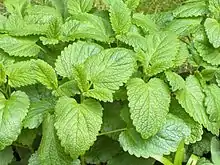Melissa
Translingual
Etymology
Ancient Greek μέλισσα (mélissa, “honey bee”) (compare Melissa), which in turn comes from μέλι (méli, “honey”).
Hypernyms
- (genus): Eukaryota – superkingdom; Plantae – kingdom; Viridiplantae – subkingdom; Streptophyta – infrakingdom; Embryophyta – superphylum; Tracheophyta – phylum; Spermatophytina – subphylum; angiosperms, eudicots, core eudicots, asterids, euasterids I - clades; Lamiales - order; Lamiaceae - family; Nepetoideae - subfamily; Mentheae - tribe; Salvinae - subtribe
Hyponyms
- (genus): Melissa officinalis - type species; Melissa axillaris, Melissa flava, Melissa yunnanensis - other species
References
 Melissa (plant) on Wikipedia.Wikipedia
Melissa (plant) on Wikipedia.Wikipedia  Melissa on Wikispecies.Wikispecies
Melissa on Wikispecies.Wikispecies  Melissa (Lamiaceae) on Wikimedia Commons.Wikimedia Commons
Melissa (Lamiaceae) on Wikimedia Commons.Wikimedia Commons - Melissa at USDA Plants database
English
Etymology
From Ancient Greek μέλισσα (mélissa, “bee, honey, or honeybee”). In Ireland it is sometimes used as a feminine form of the Gaelic male name Maol Íosa (literally “servant of Jesus”).
Pronunciation
- (US) IPA(key): /məˈlɪsə/
Audio (Southern England) (file) - Rhymes: -ɪsə
Proper noun
Melissa
- (Greek mythology) Bee-nymph in Greek mythology.
- A female given name from Ancient Greek. Popular in the latter half of the 20th century.
- 1596, Edmund Spenser, “Book VI, Canto XII”, in The Faerie Queene. […], London: […] [John Wolfe] for William Ponsonbie, →OCLC:
- And her owne handmayd, that Melissa hight / Appointed to attend her dewly day and night
- 1840 April – 1841 November, Charles Dickens, “(please specify the chapter number or name)”, in The Old Curiosity Shop. A Tale. […], London: Chapman and Hall, […], published 1841, →OCLC:
- Miss Melissa Wackles was the eldest daughter, Miss Sophy the next, and Miss Jane the youngest.
- 1959, Nicholas Blake, The Widow's Cruise, page 9:
- - - - by Mrs. Melissa Blaydon and Miss Ianthe Ambrose.
"Well, they may be sisters," said Nigel. "Those elegant, classical Christian names suggest one father.
Translations
female given name
|
See also
- Melitta (< μέλιττα (mélitta))
Danish
Finnish
Etymology
From Ancient Greek μέλισσα (mélissa).
Pronunciation
- IPA(key): /ˈmelisːɑ/, [ˈme̞lis̠ːɑ̝]
- Rhymes: -elisːɑ
- Syllabification(key): Me‧lis‧sa
Declension
| Inflection of Melissa (Kotus type 9/kala, no gradation) | ||||
|---|---|---|---|---|
| nominative | Melissa | Melissat | ||
| genitive | Melissan | Melissojen | ||
| partitive | Melissaa | Melissoja | ||
| illative | Melissaan | Melissoihin | ||
| singular | plural | |||
| nominative | Melissa | Melissat | ||
| accusative | nom. | Melissa | Melissat | |
| gen. | Melissan | |||
| genitive | Melissan | Melissojen Melissainrare | ||
| partitive | Melissaa | Melissoja | ||
| inessive | Melissassa | Melissoissa | ||
| elative | Melissasta | Melissoista | ||
| illative | Melissaan | Melissoihin | ||
| adessive | Melissalla | Melissoilla | ||
| ablative | Melissalta | Melissoilta | ||
| allative | Melissalle | Melissoille | ||
| essive | Melissana | Melissoina | ||
| translative | Melissaksi | Melissoiksi | ||
| abessive | Melissatta | Melissoitta | ||
| instructive | — | Melissoin | ||
| comitative | See the possessive forms below. | |||
| Possessive forms of Melissa (Kotus type 9/kala, no gradation) | ||||||||||||||||||||||||||||||||||||||||||||||||||||||||||||||||||||||||||||||||||||||||||||||||||||||||||||||||||||||||||||||||||||||||||||||||||||||||||||||||||||||||||||||||||||||||||||||||||||||||||||||||||||||||||||||||||||||||||||||||||||||||||||||||||||||||||||||||||||||||||||||||||||||||||||||||||||||||||||||||||||||||||||||||||||||||||||||
|---|---|---|---|---|---|---|---|---|---|---|---|---|---|---|---|---|---|---|---|---|---|---|---|---|---|---|---|---|---|---|---|---|---|---|---|---|---|---|---|---|---|---|---|---|---|---|---|---|---|---|---|---|---|---|---|---|---|---|---|---|---|---|---|---|---|---|---|---|---|---|---|---|---|---|---|---|---|---|---|---|---|---|---|---|---|---|---|---|---|---|---|---|---|---|---|---|---|---|---|---|---|---|---|---|---|---|---|---|---|---|---|---|---|---|---|---|---|---|---|---|---|---|---|---|---|---|---|---|---|---|---|---|---|---|---|---|---|---|---|---|---|---|---|---|---|---|---|---|---|---|---|---|---|---|---|---|---|---|---|---|---|---|---|---|---|---|---|---|---|---|---|---|---|---|---|---|---|---|---|---|---|---|---|---|---|---|---|---|---|---|---|---|---|---|---|---|---|---|---|---|---|---|---|---|---|---|---|---|---|---|---|---|---|---|---|---|---|---|---|---|---|---|---|---|---|---|---|---|---|---|---|---|---|---|---|---|---|---|---|---|---|---|---|---|---|---|---|---|---|---|---|---|---|---|---|---|---|---|---|---|---|---|---|---|---|---|---|---|---|---|---|---|---|---|---|---|---|---|---|---|---|---|---|---|---|---|---|---|---|---|---|---|---|---|---|---|---|---|---|---|---|---|---|---|---|---|---|---|---|---|---|---|---|---|---|---|---|---|---|---|---|---|---|---|---|---|---|---|---|---|---|---|---|---|---|---|---|---|---|---|---|---|---|---|---|---|---|---|---|---|
| ||||||||||||||||||||||||||||||||||||||||||||||||||||||||||||||||||||||||||||||||||||||||||||||||||||||||||||||||||||||||||||||||||||||||||||||||||||||||||||||||||||||||||||||||||||||||||||||||||||||||||||||||||||||||||||||||||||||||||||||||||||||||||||||||||||||||||||||||||||||||||||||||||||||||||||||||||||||||||||||||||||||||||||||||||||||||||||||
Statistics
- Melissa is the 330th (tied with 1 other name) most common female given name in Finland, belonging to 1,361 female individuals (and as a middle name to 1,036 more), according to February 2023 data from the Digital and Population Data Services Agency of Finland.
German
Etymology
From Ancient Greek μέλισσα (mélissa, “bee”).
Pronunciation
- IPA(key): /meˈlɪsa/
Audio (file) - Hyphenation: Me‧lis‧sa
Italian
Pronunciation
- IPA(key): /meˈlis.sa/
- Rhymes: -issa
- Hyphenation: Me‧lìs‧sa
Portuguese
Etymology
Borrowed from Latin Melissa, from Ancient Greek Μέλισσα (Mélissa), from μέλισσα (mélissa, “bee”).
Pronunciation
- (Brazil) IPA(key): /meˈli.sɐ/
- (Southern Brazil) IPA(key): /meˈli.sa/
- (Portugal) IPA(key): /mɨˈli.sɐ/
Proper noun
Melissa f
- a female given name from Ancient Greek, equivalent to English Melissa
- (Greek mythology) Melissa (nymph who discovered and taught the use of honey)
Swedish
Pronunciation
Audio (file)
This article is issued from Wiktionary. The text is licensed under Creative Commons - Attribution - Sharealike. Additional terms may apply for the media files.
